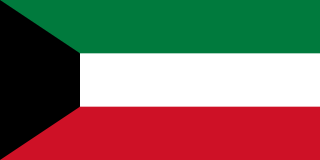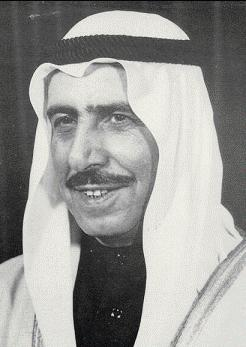Related Research Articles

The House of Sabah is the ruling family of Kuwait.

The National Assembly is the unicameral legislature of Kuwait. The National Assembly meets in Kuwait City. Political parties are illegal in Kuwait, candidates run as independents. The National Assembly is made up of 50 elected members and 16 appointed government ministers.

Nasser Al-Mohammed Ahmad Al-Jaber Al-Sabah is a Kuwaiti politician who served as Prime Minister of Kuwait from 7 February 2006 until resigning on 28 November 2011.

Kuwait, officially the State of Kuwait, is a country in Western Asia. It is situated in the northern edge of Eastern Arabia at the tip of the Persian Gulf, bordering Iraq to the north and Saudi Arabia to the south. Kuwait also shares maritime borders with Iran. Kuwait has a coastal length of approximately 500 km (311 mi). Most of the country's population reside in the urban agglomeration of the capital city Kuwait City. As of 2022, Kuwait has a population of 4.45 million people of which 1.45 million are Kuwaiti citizens while the remaining 3.00 million are foreign nationals from over 100 countries.

Kuwait is an emirate with an semi-democratic political system. The political system consists of an appointed judiciary, appointed government, and nominally elected parliament.

Sheikh Jaber Al-Mubarak Al-Hamad Al-Sabah is a Kuwaiti royal and former politician who served as the prime minister of Kuwait from 2011 to 2019. Previously he served as minister of defense as well as deputy prime minister. In April 2021 a Kuwaiti court ordered his detention on corruption charges.
Faisal Al-Meslim Al-Osaimi Al-Otaibi is a former Kuwaiti politician, representing the third district. Born in 1962, Al-Meslim studied Political History at the University of Wales and worked as a professor before being elected to the National Assembly in 2003. Al-Otaibi is considered an Independent deputy and affiliates with the Islamist members.
Waleed Al-Tabatabaie was a member of the Kuwaiti National Assembly, who represented the third district. Born on 4 April 1964, Al-Tabtabaie obtained a PhD in Islamic studies from Al-Azhar and was an assistant professor at Kuwait University before being elected to the National Assembly in 1996. Al-Tabtabaie affiliated with the Islamist deputies.

Kuwait National Assembly No-Confidence Votes
The first bill which would have given women the right to vote in Kuwait was put to the parliament in 1963. It was ultimately overturned due to pressure from conservatives. Bills continued to be denied through 1985 and 1986. Kuwait then became heavily involved in the Iraq-Iran war, and women began demanding recognition for their efforts in keeping their families and society functional. The parliament agreed and the first woman was finally appointed as the ambassador of the Persian Gulf in 1993. In 1996, 500 women stopped working for an hour to show solidarity in their right for suffrage, and demonstrations continued throughout the next 6 years. In May 1999 a decree that allowed women the right to vote and run for office was issued by the emir, however it was overruled again by the parliament 6 months later.

The women of Kuwait have experienced many progressive changes since the early 20th century. Since then, women have had increased access to education, gained political and economic rights, and financial power. They can serve in the police, military, and as judges in courts. However, women in Kuwait struggle against a patriarchal culture which discriminates against them in several fields. Kuwait's Bedoon (stateless) women are at risk of significant human rights abuses and persecution, Kuwait has the largest number of Bedoon in the entire region.

Early general elections were held in Kuwait on 16 May 2009, the country's third in a three-year period. Kuwait had voted on six occasions between 1991 and 2009. The turnout rate was 50%. The election was notable in that four women were elected for the first time since Kuwait gained independence from the United Kingdom in 1961.
Al Jahra is a town and city located 32 kilometres (20 mi) west of the centre of Kuwait City in Kuwait. Al Jahra is the capital of the Al Jahra Governorate of Kuwait as well as the surrounding Al Jahra District which is agriculturally based. Encyclopædia Britannica recorded the population in 1980 as 67,311. Historically, Jahra was a predominantly agricultural area. There are currently various farms in Jahra.

Marzieh Vahid-Dastjerdi is an Iranian university professor and former parliamentarian, who was Iran's minister of health and medical education. She was part of the President Mahmoud Ahmedinejad's inner circle.

Sheikh Sabah III Al-Salim Al-Sabah was the second ruler of Kuwait after it gained independence from Great Britain, titled the Emir of the State of Kuwait and Commander of the Kuwait Military Forces from 24 November 1965 until his death in 1977. The youngest son of Salim Al-Mubarak Al-Sabah, Sabah succeeded his half-brother Abdullah Al-Salim Al-Sabah upon his death in 1965. He suspended parliament in late August 1976 for four years, claiming it was acting against the nation. He was the 12th ruler in the family dynasty.

Sheikh Saad Al-Abdullah Al-Salim Al-Sabah was the Emir of Kuwait and Commander of the Kuwait Military Forces during a short reign of nine days, succeeding Sheikh Jaber Al-Ahmad Al-Jaber Al-Sabah.

The Kuwait Police is an agency of the Ministry of Interior of Kuwait, which maintains the national security envelope, defense of land border, coastal and the rule of law in the State of Kuwait. The Kuwait Police Agency was established in 1938 by Ahmad Al-Jaber Al-Sabah as the Directorate of Public Security Force.

Sabah Al Khalid Al Sabah is a Kuwaiti diplomat and politician who served as the Prime Minister of Kuwait from 2019 to 2022. he served in different governmental posts from 2006 until 2019. He is a senior member of the ruling Al Sabah family.
The following lists events that happened during 2011 in Kuwait.
Events in the year 2021 in Kuwait.
References
- ↑ "Women In Gulf Politics: A Progress Report". The Washington Institute for Near East Policy. 28 May 2005.
- ↑ "Kuwait's woman minister sworn-in". BBC. 20 June 2005.
- ↑ "Person of the Week: Dr. Massouma al-Mubarak". ABC News. 17 June 2005.
- ↑ "Kuwait Names Woman Minister". Arab News. 13 June 2005.
- ↑ Diana Elias (11 August 2002). "Coeducation Nears End at Kuwait University". Los Angeles Times.
- ↑ "Kuwait Names First Woman Cabinet Member". Asharq Alawsat. 13 June 2005. Retrieved 23 April 2013.
- ↑ "Kuwait health minister resigns after hospital fire". Reuters . 25 August 2007.
- ↑ "Kuwait votes for first female MPs". BBC . 17 May 2009.